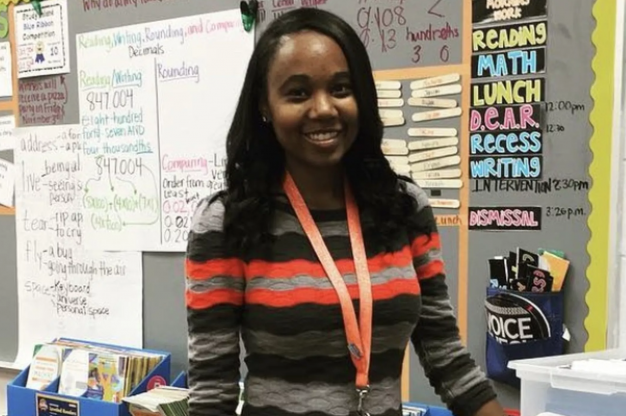
‘A sense of normalcy’: how this Detroit teacher and Homework Hotline tutors is empowering families
Ronye Craft spends much of the day teaching virtual lessons to her fourth-graders at Marcus Garvey Academy. But her teaching responsibilities don’t end there. In the evenings, she’s at it again, this time as a Homework Hotline tutor who helps students through tough math problems.
It’s a job Craft finds especially meaningful in the wake of a pandemic that has closed school buildings and shifted learning either online or via paper packets.
“I just want my students, and myself, to have or feel a sense of normalcy. Giving them that outlet, talking to them has helped me navigate this,” she said.
The Detroit school district launched the Homework Hotline in 2019, providing an outlet for students who need help with math and English language arts lessons outside of school hours. Craft noticed an increase in calls soon after the pandemic closed school buildings.
‘Fresh perspective’
Calls to the service range between 20 minutes to an hour. Hotline tutors can offer a fresh perspective when a student or parent may be stuck on a concept, Craft said.
The tutors also reach students and parents who may lack technology or an internet connection. The district estimates only 10% of students consistently access online learning, and the district won’t distribute devices and Wi-Fi hotspots till June.
Chalkbeat spoke with Craft about how she guides students through assignments and invites parents to listen in, her most memorable exchanges so far, and how she’ll welcome students back when school buildings reopen.
This interview has been lightly edited for clarity.
Why did you join the Homework Hotline?
I know that we have many working parents who can’t support their students the way that they would like to, and I’m all about being successful.
So if you’re thinking about putting students first and what can you do to put them in a position to be successful, you have to be able to adapt. So I was completely on board with just giving them the extra support that they need.

‘Breaking down the problem’
When students call in, we want to create an environment where the students as well as the parents can learn so we’ll ask, ‘Hey, is there someone, an adult around?’ We’ll suggest that they listen in and sometimes, a parent will call in and ask, ‘Hey, so I’m just trying to figure out if I’m doing this correctly.’
How do you help a student or parent work through a problem over the phone?
First, you greet them, ‘Good afternoon or good evening,’ and ‘Thank you for calling in.’ You get the school they attend, you get their name, and then you also get their grade.
And then from there you ask them: ‘Tonight, why are you calling in?’
And so they’ll tell you exactly what they’re working on. And then from there, I may ask, ‘Okay, well, tell me, how does your teacher approach this question?’ Then some of the students are able to vocalize that and kind of talk through where they might not have picked up on something. Then I’m just breaking down the problem and talking with them, using the teacher’s manual at the same time.
‘You’re able to empower them’
You might have to stay on a phone with them for an hour, or allow them to talk through step by step on how to complete that problem. You’re able to empower them because perhaps they don’t have a voice, or they don’t feel comfortable with being in the classroom setting. They can feel free to have a conversation with the teacher.
What have been some memorable interactions you’ve had with students so far?
One student, Christopher, calls every week. We might do two homework assignments on Monday, and then he’ll call in on Wednesday. And we’ll do two more assignments. It makes you feel good because you have a student calling in to request to talk to you.
You get all sorts of things. You may get a child that says, ‘Okay, okay, okay, I got it, I don’t need you anymore.’ Other times you just hear the excitement in their voice. Those are the moments where you’re like, ‘This is great.’
What are you worried about during the school closures?
We don’t want them to have any regression in everything that they’re learning. So I always encourage my students to continue that learning, letting them know that we are here, and we’re available.
‘An outlet to talk’
Looking ahead, what are your hopes for students when they finally return to the classroom?
When we return, I want to welcome the school community with open arms. But I also want to give students an outlet to talk about their experiences. Just as everyone else, kids are also feeling. I have students who are really sad about the school year ending early.
This article was written by Eleanore Catolico and originally published by Chalkbeat Detroit
Chalkbeat is a US-based nonprofit news site covering educational change in public schools.




